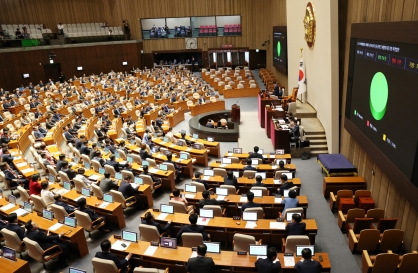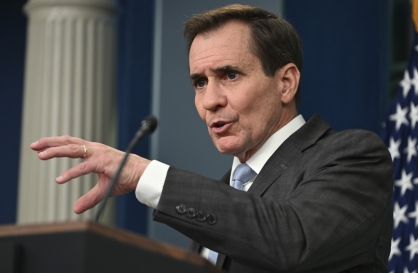BERLIN (AP) ― German officials on Monday downplayed prospects of any quick and dramatic change of course in the eurozone debt crisis, days before a parliamentary vote on beefing up the continent’s rescue fund.
Weekend meetings of global financial leaders in Washington raised hopes of a change in strategy, with officials indicating they would focus on further boosting the firepower of the 440 billion euro ($595 billion) rescue fund ― perhaps by allowing it to tap loans from the European Central Bank or otherwise leveraging its lending capacity.
Hopes for such a move boosted European stock markets on Monday, with German and French bank shares rising strongly.
However, ahead of a parliamentary vote Thursday on changes to the fund that eurozone leaders already agreed to in July, Berlin was keen to underline its attachment to its often-criticized step-by-step approach.
President Barack Obama, meanwhile ― speaking Monday in California ― said the financial crisis rippling through Europe is “scaring the world” and that steps taken by European nations to stem the eurozone debt problem “haven’t been as quick as they need to be.”
Obama said Europe never fully healed from the financial crisis in 2007, and its troubles have spilled beyond the continent and are affecting the U.S. economy as well.
His comments were in response to a question posed by a laid-off worker.
Thursday’s vote on expanding the powers of the rescue fund, the so-called European Financial Stability Facility, will be followed over the coming months by final decisions on a second bailout package for Greece and on a permanent rescue mechanism meant to replace the EFSF from 2013, Finance Ministry spokesman Martin Kotthaus noted.
“That is quite simply the procedure that lies in front of us ― we will work through it step by step,” Kotthaus said.
When asked in Washington whether he supported the idea of leveraging the rescue fund, German Finance Minister Wolfgang Schaeuble said: “Of course we will use the EFSF in the most efficient way possible.”
The discussion about the new rescue fund powers is taking place amid speculation that Greece ultimately will be unable to pay its debts and will have to force heavy losses on bondholders. That would be beyond a 21 percent sacrifice agreed to under a second, euro109 billion bailout deal for Greece. Greek and other officials deny that will happen.
In an interview with n-tv television Monday, Schaueble was asked whether there is a plan to move up the effective July 2013 date of the long-term rescue mechanism, or ESM.
Schaeuble pointed out that the process of establishing the ESM, which would allow a country to go bankrupt and default on its debts, takes time.
“That doesn’t go very fast,” Schaeuble said. “If we could do it faster ... it would be good, but probably we will need the time that we have calculated.”
Some in Chancellor Angela Merkel’s center-right coalition already find the beefing up of the EFSF by giving it new powers hard to swallow, and anything beyond that could be a hard sell among its lawmakers.
Christian Lindner, the general secretary of the Free Democrats ― Merkel’s junior coalition partner ― called on the chancellor to provide clarity and stressed that his party opposes allowing the fund to tap ECB loans.
“The true intentions of the government and the chancellor are on the table,” Merkel spokesman Steffen Seibert said. “They will be decided on in parliament Thursday.”
The rescue measures were criticized once again by Germany’s top central banker, Bundesbank head Jens Weidmann.
Weidmann said in a speech in Washington that the package of support measures for indebted governments “weakens the underlying principle of European monetary union that each country has to bear the full consequences of its own fiscal policy.”
Efforts to shield governments from the consequences of their behavior means “we risk seeking the propensity for excessive deficits rise even further in the future.”
Weidmann was until earlier this year Merkel’s economic adviser, but since his appointment at the Bundesbank he has defended its traditional strict approach to monetary and fiscal policy.
Merkel has been caught between criticism from abroad for doing too little and from supporters at home who fear she is putting taxpayer money at risk. She went on German television Sunday night to defend her step-by-step tackling of the crisis.
She warned of the dangers a radical restructuring of Greek debt might bring at this stage.
“Lehman Brothers was allowed to go bust, and then the world was surprised that it fell into a deep crisis,” Merkel said on ARD television. “What we have to learn is that we can only take steps we can really control.”
“What we cannot do is, along the way, destroy the confidence of all investors, and have them say, OK, they did this with Greece now, tomorrow they’ll do it with Spain, the day after with Belgium or some other country,” Merkel said. “Then no one anywhere would invest their money in Europe any more, and we have to prevent that.”




![[New faces of Assembly] Architect behind ‘audacious initiative’ believes in denuclearized North Korea](http://res.heraldm.com/phpwas/restmb_idxmake.php?idx=644&simg=/content/image/2024/05/01/20240501050627_0.jpg)


